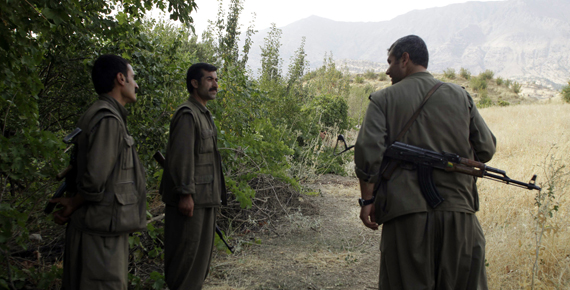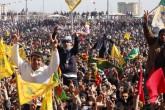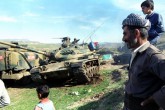In 2009, for the first time in history, a government officially raised the Kurdish issue in an effort to find a solution. One of the basic questions in the resolution process that was initiated by the Justice and Development Party (AKP) was, “Where should the PKK lay down its arms?” Both the government and the PKK are at their least experienced when it comes to disarmament. Before the government could even arrange for a location for the guns, the PKK took up arms again. For the last two years, the PKK has implicated itself in an increasing number of terrorist acts, consistently intensifying the provocation process that began with the Resadiye shooting. PKK attacks increased in parallel to the most intense democratization efforts Turkey has seen to date. The only thing that has changed in regard to the PKK in the last two years was our question. We now ask: Does the PKK want to lay down its arms?
The political anachronism of the PKK’s understanding, not only of Turkey, but of the entire region was revealed with the Syrian crisis and the PKK has transformed itself to one of the most effective actors of Kurds’ alienation in the region. The PKK’s political strategies, which did not prevent the PKK from appearing in support of the Baathist regime, face this question today: Can the PKK lay down its arms? In fact, it becomes one of the rare points on which both Kurds and Turks agree on the Kurdish issue. Nearly 80 percent of both Kurds and Turks responded to the question: “Are there any conditions under which the PKK can disarm?” by stating that “the PKK cannot disarm.” In this question the phrase “under any conditions” was just as important as disarming. What it means is that the 80 percent of the answers given to the hypothetical question “can the PKK disarm,” without any political, legal, social or psychological conditions, was negative.
When the same question is directed to the PKK, the picture is even more complex. After the organization lost its leader the PKK became an organization that failed to update the raw political positions of the 80s, even when it has become an international structure in the 2000s. It is now an organization that is having a political jetlag problem in the context of the Middle East. The PKK, with its unchanging leadership and slogans for the last 30 years, has sentenced itself to remain an organization that is trapped in the mountains. To reiterate, no matter how the PKK chooses to write the history, there is one bitter fact we all know: The PKK took up arms not because it was forced to, but because it chose to follow an ill-advised political strategy.
Therefore, in the 2013 initiative for a resolution in the Kurdish issue that began with meeting the imprisoned PKK leader Abdullah Ocalan, one of the most important issues to pay attention to is the occurrence of the actor problem the PKK has so bitterly experienced. From the PKK’s perspective the crisis is much deeper. The PKK will either overcome its actor crisis by submitting itself to the leadership defined by Ocalan, or the “doubts about leadership” that were revealed in the 2010 in a public survey about Ocalan will only intensify. But most importantly, unless the PKK articulates the phrase “we can disarm” hypothetically, its disarmament in reality will not be possible.
Hurriyet Daily News, January 11, 2012
In this article
- Domestic Policy
- Opinion
- 2000
- 2009
- 2010
- 2012
- 2013
- Abdullah Öcalan
- Global Actors | Local Actors
- İmralı
- Kurdish Community
- Kurdish Question
- Kurdistan Workers' Party Terrorist Organization (PKK)
- Middle East
- PKK - YPG - SDF - PYD - YPJ - SDG - HBDH - HPG - KCK - PJAK - TAK - YBŞ
- Syria
- Syrian Civil War
- Syrian Conflict
- Syrian Crisis
- Terror



